Interview by Alison Hugill // Dec. 06, 2019
Priscila Rezende presented the German premier of her performance ‘Nau Frágil’ at Ballhaus Naunynstraße this week, as part of the festival ‘Postcolonial Poly Perspectives.’ In the black box of the theatre, barefoot and caged within a barbed-wire enclosure and several rows of thorny, white roses, the Brazilian artist initially took a sure-footed stance, looking into the eyes of the audience as we took our places around the outside of the fence. Though our comparative freedom was palpable—we could move around, even leave if we wanted to—there was a strong sense that Rezende held the power in this situation; she had invited us here, she was in charge of the narrative. As the night went on, this dynamic flipped, she became more vulnerable and more agitated, reaching out to us without words to signal that she was not, in fact, in control. We, the audience, had the responsibility to stop the performance, to free her.
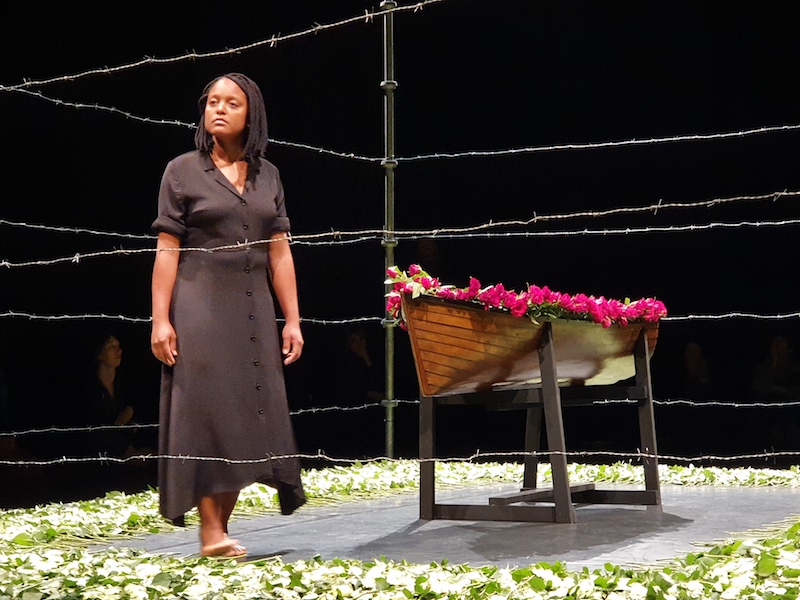
Priscila Rezende: ‘Nau Frágil’, 2019 performance at Ballhaus Naunynstrasse // © Wagner Carvalho
In the work, there are obvious visual parallels to a brutal history of colonialism, which often saw young, black women—most famously, the South African Sarah Baartman—caged and on display as attractions for white European viewers. In her provocative practice, Rezende uses direct strategies and tactics to confront her audiences with these uncomfortable, violent histories. Moreover, she interrogates police brutality and ongoing violence against black people and, through her thoughtful works, forces conversations about the racist discrepancy in how lives are valued.
We spoke to Rezende about her performance ‘Nau Frágil’ and some of the wider political concerns of her work.
AH: What is the meaning of the title of your performance, ‘Nau Frágil’?
PR: I wanted the title to remain in Portuguese because it’s a kind of word play. It references the boats that people are travelling in, which are fragile. But “nau” means a specific kind of boat. When we study the history of Brazil and we learn about when the Portuguese “discovered” Brazil, they arrived in three different ships, one of which was called “nau.” But these two words (nau frágil) are similar to another word “naufrágio” – the pronunciation is the same, but it means “shipwreck.”
It’s a fragile boat but also the situation of drowning. It’s a metaphor for the crisis in Europe. I believe Europe is this fragile ship, that can’t deal with the situation. I read this iconic phrase once: “We are here because you were there.” I think of this often, about all the situations of migration and discrimination.
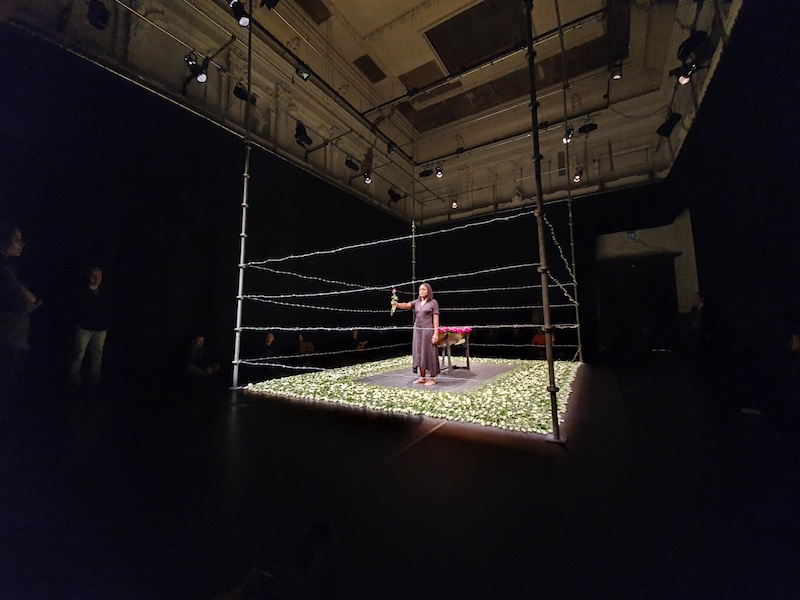
Priscila Rezende: ‘Nau Frágil’, 2019 performance at Ballhaus Naunynstrasse // © Wagner Carvalho
Alison Hugill: What historical or contemporary issues does this performance address?
Priscila Rezende: The first time I did the performance was in Poland. There are some topics that I am always thinking about and keep in mind to put into a work when I have the opportunity. When I received the invitation to create a performance in Poland, I was already thinking about what I had heard on the news, on the internet and on television, about people trying to get across the ocean to Europe. Years ago there was a very sad picture that went viral, of a young boy dead on the beach. I also saw a lot of photos of dead black people.
I don’t want to be insensitive but I noticed that I didn’t see the same reaction to those deaths, to the deaths of black people. I am not saying that other people’s lives are not important, but there is an obvious difference in how we deal with different people’s deaths.
I don’t think it’s just my imagination: some lives are just less valued. In Germany, there is a huge culture of remembrance about murdered Jews, for example. I come from a place that has a hard history of murdering black people. We are still facing racism. But this is not treated in the same way. I know that we can not compare tragedies but there is a big discrepancy.
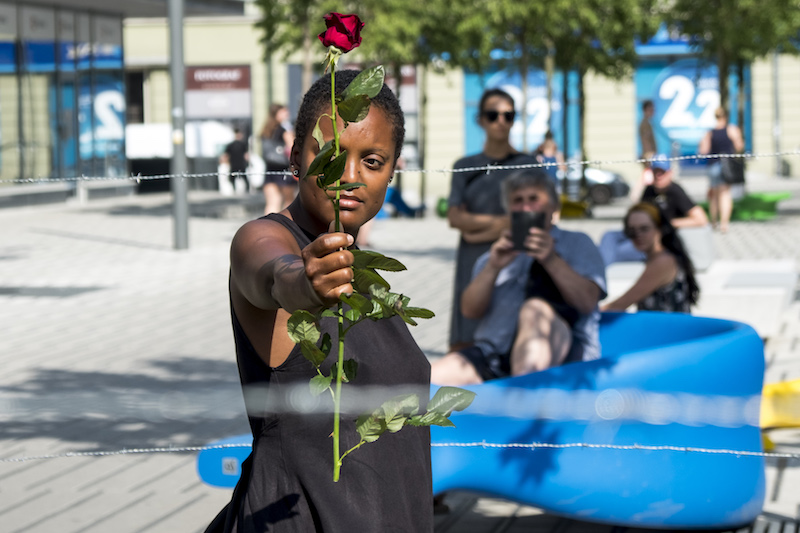
Priscila Rezende: ‘Nau Frágil’, 2019, performance at maltafestival in Poland // Photo by Adam Ciereszko
AH: In your work you are interested in forcing difficult conversations and direct dialogue with audiences, especially regarding topics of discrimination and racism. What is the role of discomfort in your practice?
PR: People feel uncomfortable most of the time in my performances. I create images that are so hard to see. I am trying to be more sensitive. In my latest work, I bring the roses to make it more sensitive. But, to be honest, what I’m talking about is so hard that I don’t think I can make it soft. I like to be direct because I believe when we are more direct it’s harder for people to dodge the reality. It’s harder for people to pretend that they don’t understand what I’m talking about. In Brazil, people avoid recognizing that their racism exists; it’s a comfortable place for them to stay. I don’t want them to be able to ignore it.
I am the result of… I don’t want to call it migration… but most of my ancestors were kidnapped. I am trying to think about how what is happening here in Europe is connected to my history. It’s not the first time that we see people drowning in the ocean, crossing continents in difficult situations. My ancestors crossed the ocean from Africa to America. Some people believe that people crossing the ocean now are choosing this, but many are forced for various reasons. People here are upset that people are coming to live here, as if people are coming because they want to. And many are coming from countries that were colonized by Europe so it’s very hypocritical.
AH: How does this performance change in different contexts? The results must have been very different in public space in Poland and here in the black box theatre in Berlin.
PR: It was a huge challenge. I stayed two-and-a-half hours in the installation in Poland, until someone came to free me. The proposition of the performance is to try to make people think about their freedom, and me caged inside these white roses and their thorns and the barbed wire. I can only get out if someone helps me; so I stay there until someone comes or the time limit of the performance is reached. In Poland, it was very hot and sunny outside.
I like working in the street because the possibilities are infinite: many different people pass. Many people refused to take the roses I offered them. Many ignored me entirely, some people pretended I wasn’t even there.
When I was invited to do the performance here it was a different challenge because it’s a closed space and people come specifically to see a performance. It’s a very different relationship. That’s why I had to spend more time looking into people’s eyes and creating a connection. I needed to show people that I was feeling uncomfortable and I wanted to get out. On the first day, no one helped me. I felt like they wanted to but didn’t know if they could. They almost did, actually. The intention is not just for me to be freed but to provoke this feeling in people.
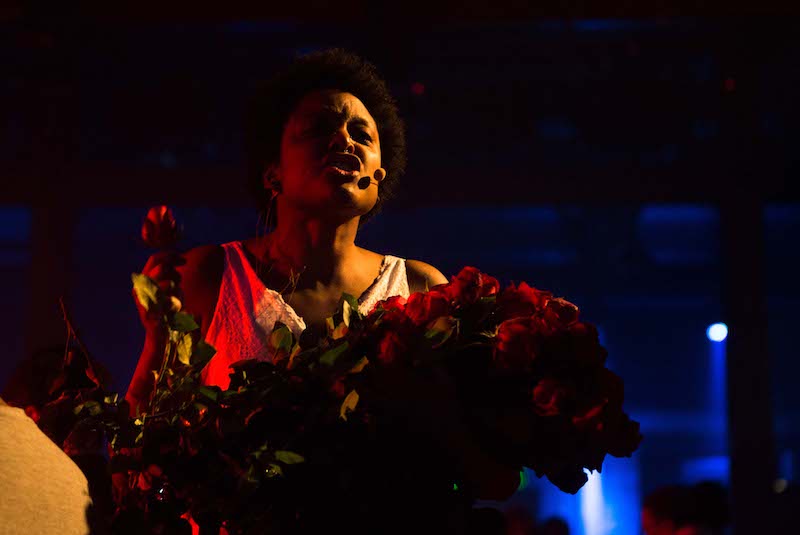
Priscila Rezende: ‘Yell’, 2018, performance // Photo by Daisy Serena, Courtesy of the artist
AH: You have certain direct strategies that you use to address colonialism and racism. Your pieces ‘Yell’ and ‘All of which are american dreams’ (2018) are both dealing with police violence against black people. Can you talk about those works?
PR: Both of those works are about violence against black people. It’s something we still face in Brazil. Many black youths are murdered by the police in Brazil. Often these deaths are justified in relationship to drug wars. In ‘Yell’ (2018) I shout the names of people who were killed by police violence; all young people who were killed for doing nothing. In many situations the police claim it was a case of mistaken identity. In Brazil there is a policy of shoot-first-check-later, especially with black people. In the piece, I carry 111 roses to recall the murder of five boys who were killed in their car, coming back home from a celebration of a first pay cheque from one of their jobs. The police shot their car 111 times and later claimed they mistook the car for a drug dealer’s car.
Last year, Marielle Franco [a black Brazilian politician] was assassinated after speaking out about police violence in Brazil. My work ‘All of which are american dreams’ (2018) came out of an artist residency in the U.S. that took place about three months after Franco’s murder. In Brazil, we had also heard a lot about police violence in the U.S. so I wanted to speak about this common racism. I made an installation with t-shirts that I had found in Brazil, after researching the clothes many of the young people were wearing when they were killed. I re-created the yellow t-shirt Marielle Franco wore, which is very symbolic because it said “Mulheres Na Politica” [Women in Politics]. Her visibility and activism were the reasons she was killed. I started to research clothes that some black boys were wearing in the U.S. when they were killed, as well. I cut the hearts out of the t-shirts, and through them at the end on the far wall, you could see the bullets. There was also an audio piece with heartbeats and sounds of gunshots every 23 seconds, to mirror the statistic that every 23 minutes, a black person is killed in Brazil.

Priscila Rezende: ‘All of which are american dreams,’ 2018, installation // Photo by Priscila Rezenda, courtesy of the artist
The title of the piece comes from the lyrics of a Rage Against the Machine song, called ‘Know Your Enemy.’ At the open studio celebration, we wanted to stage the performance with a gun, somewhat as a surprise, but we didn’t want to scare people. I was wearing a t-shirt from the installation. I told people, through a red megaphone, that the performance was going to start in five minutes and that “any similarity to real life is not a coincidence.” I offered the audience juice and wine to toast Brazil, where young black people are murdered, and the U.S., where black people are 9 times more likely to be killed than white people. Let’s celebrate, people are dying! Then, my collaborator came and held a gun to me, and I yelled “This is the American Dream!” and I spilled the wine on the t-shirt. After, I returned the t-shirt to the installation.
When I was invited to this residency in upstate New York, I was awarded a fellowship that was called the “American Dream.” They give it to an artist who had never been to the U.S. I honestly never had this dream to go to the U.S. but that’s how it was framed. It was a nice opportunity but the name was quite funny. When I was there and thinking about the situation in the U.S., the ethos and belief that America is a dream, I wondered: to whom?
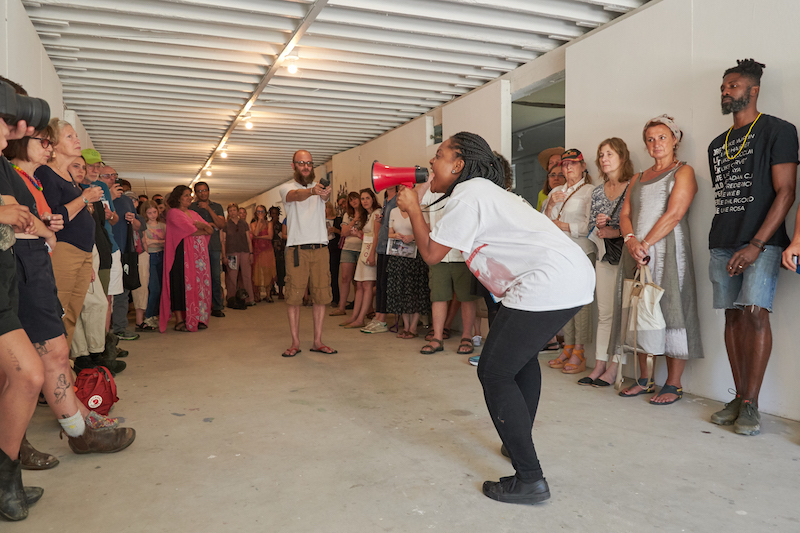
Priscila Rezende: ‘All of which are american dreams’, 2018, still from video of performance // Photo by Ross Willows, courtesy of the artist























